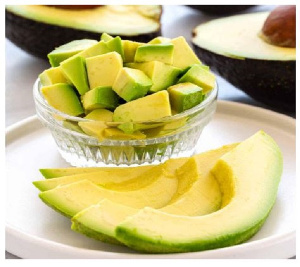Avocados have been regarded as the most nutrients packed food on the planet. It also has the spotlight as a global superfood. Interestingly, many have linked the color of avocados in Ghana to increase cholesterol and weight. However, this assertion is wrong!
Studies have confirmed that avocados contain a hearty dose of important nutrients, such as fiber, good fats, potassium, and vitamin K. That’s why there are several avocado benefits, with research suggesting that avocados could help enhance heart health, boost weight loss and keep your digestive tract running smoothly.
Though, others regard them as fruit and vegetables. The avocado tree, also known as Persea americana, is a member of the laurel family(Bhuyan et al. 2019). Different types of avocados are found, the Hass avocado is the most popular variety, but there are several other less-common kinds available as well, including Bacon, Lula, Pinkerton, Fuerte, and Gwen avocados.
Avocados: Nutritional Profile
136 grams of avocado contains approximately:
227 calories
11.8 grams carbohydrates
2.7 grams protein
21 grams fat
9.2 grams fiber
28.6 micrograms vitamin K (36 percent DV)
121 micrograms folate (30 percent DV)
12 milligrams vitamin C (20 percent DV)
0.4 milligrams vitamin B6 (20 percent DV)
2 milligrams pantothenic acid (20 percent DV)
689 milligrams potassium (20 percent DV)
2.7 milligrams vitamin E (13 percent DV)
2.6 milligrams niacin (13 percent DV)
0.2 milligrams copper (12 percent DV)
0.2 milligrams riboflavin (11 percent DV)
39.4 milligrams magnesium (10 percent DV)
0.2 milligrams manganese (10 percent DV)
0.1 milligram thiamine (7 percent DV)
73.4 milligrams phosphorus (7 percent DV)
0.9 milligrams zinc (6 percent DV)
0.8 milligrams iron (5 percent DV)
200 international units of vitamin A (4 percent DV)
In addition, this fruit also contains some omega-3 fatty acids, omega-6 fatty acids, choline, betaine, calcium, and selenium. As espoused above, Bird et al.(2017) found that avocados are loaded with diverse nutrients which are absent in our modern-day diets such as magnesium, B6, vitamin C, vitamin E, and folate. For instance, half of an avocado contains 10% of the daily value (DV) for potassium. Potassium is important for hypertensive patients.
The U.S. Department of Health and Human Services and the U.S. Department of Agriculture. 2015–2020 Dietary Guidelines for Americans. 8th Edition. December (2015) regards potassium as a “nutrient of public health concern” as most Americans do not have enough of it.
The modern-day diet is deficient in Potassium. A case in point is linked to a study(Bailey et al. 2015) that involved 4,730 U.S. adults and revealed that less than 3% had potassium consumption more than the set adequate intake for potassium of 4,700 mg per day.
Two studies( Vinceti et al. 2016; Burnier, M, 2019) agreed that Potassium is useful to help deal with many important bodily functions, such as blood pressure regulation and nervous system function. Hence, they found that consuming the right amount of potassium daily could avert hypertension and stroke. Vitamins such as C, B6, and E are also found in avocados to improve our immune health( Kumrungsee et al. 2020; Lewis et al. 2019).
For B6, about half of an avocado can give 15% of the daily needs. B6 helps suppress inflammation and protect against oxidative damage. This means that a low level of B6 consumption could adversely affect our immune function and increase susceptibility to illness (Kumrungsee et al. 2020; Qian et al. 2017; Stach et al. 2021). The abundance of B6 in avocados could help improve our health.
Avocado: Supporting Literature
Prevents the Growth of Cancer Cell
One old in vitro study(Ding et al. 2009) showed that the phytochemicals in avocados are so powerful that they could help kill off oral cancer cells. This was investigated in a preliminary study(D’Ambrosio et al. 2011) and found that the specific phytonutrient combination found within each avocado may hold the key to its anticancer effects.
Another study(Paul et al. 2011) found that phytochemicals extracted from avocados help induce cell cycle arrest, inhibit growth and promote apoptosis in precancerous and cancer cell lines. Studies also indicate that avocado phytochemicals extracted with 50 percent methanol help in the proliferation of human lymphocyte cells and decrease chromosomal changes.
An older study(Simonsen et al. 1998) found that the monounsaturated fatty acids in avocados are linked to reduced risk for both cancer and diabetes. These monounsaturated fatty acids fight against chronic disease compared to other types of fatty acids because of their ability to lower inflammation. Finally, Sayeed and Ameen (2015) also found that Beta-sitosterol, another compound found in avocados, supports healthy prostate and is linked to better immune function and lower prostate cancer risk.
Gut Health
The US Department of Agriculture found that avocados are high in fiber. The fiber content in each avocado is about 14 grams. This fiber supports the digestive system as it enhances healthy bacteria.
Due to its high fiber content, a recent study(Thompson et al. 2021) in 163 adults overweight people found that those who consumed 175 grams (men) or 140 grams (women) of avocado daily for 12 weeks had lower fecal bile acid concentrations and increased bacterial diversity compared to a control group.
An earlier study(Ocvirk and O’Keefe, 2017) found greater bile acid concentrations induce intestinal inflammation and are linked to the growth of microbes associated with negative health outcomes like colon cancer. The study further found that the avocado group had more of the bacteria Faecalibacterium, Lachnospira, and Alistipes, all of which produce short-chain fatty acids (SCFAs), including butyrate.
Some three studies(Lopez-Siles et al. 2017; Vital et al. 2017; Parker et al. 2020). It has been argued that though the studies were astonishing, the fact that they were sponsored by an organization(Hass Avocado Board) interested in avocados promotion could raise a conflict of interest and influence the study findings.
This notwithstanding, one study(Capuano, E. 2017) agrees that High-fiber foods are significant for those with digestive tract issues because fiber helps shift the balance of bacteria in the gut, raising healthy bacteria while decreasing the unhealthy bacteria that can be the root of some digestive disorders. The study added that fiber also helps add bulk to stool, supports regularity, and helps pull waste and toxins through the intestines and colon.
Link, R(2022) agrees that fats are also essential for digestion and nutrient absorption because they nourish the lining of the gut. A low-fat diet can result in constipation or symptoms of irritable bowel syndrome (IBS), which is a disorder of the gastrointestinal tract characterized by abdominal pain and change in bowel habits.
Avocado, Heart Support
Studies have confirmed that frequent eating of avocados could protect against heart disease. This contradicts the many perceptions of people who think that the color or the fat content in avocados, raise cholesterol level and increases our risk of heart disease.
A previous study( Dreher and Davenport, 2013) found that avocado and its oil encourage heart health by balancing blood lipids. For instance, the fat in the avocado is made up of 71 percent monounsaturated fatty acids, 13 percent polyunsaturated fatty acids and 16 percent saturated fatty acids.
They further noted that diets moderately high in healthy fats — specifically monounsaturated fats (MUFAs) — are known to block plaque buildup in the arteries more effectively than diets high in insulin-spiking carbohydrates. In addition to the presence of fat, the fiber in avocado and the presence of beta-sitosterol compounds help reduce cholesterol levels and blood pressure.
An older clinical study(Ledesma et al. 1996) examined the importance of healthy sources of fat on heart health. This study engineered from Mexico gave an avocado-enriched diet to both healthy adults and those with high cholesterol and analyzed the results. After one week, the study found that when healthy people with normal lipid levels ate avocados, their total cholesterol levels were reduced by 16 percent.
The results also found something astonishing in the high-cholesterol group. Apart from the drop in the total blood lipids of 17 percent, also LDLs (22 percent), and triglycerides (22 percent), on the other hand, their good HDL also were enhanced by 11 percent.
Other study findings suggest that an avocado-rich diet may help improve heart disease risk factors, which may help prevent the onset of heart disease. One recent study (Sacks et al. 2020) examined the impact of avocados on heart health. This study was sponsored by the Hass Avocado Board. Though this study is promising the involvement of the Hass Avocado Board as a peer reviewer has been contested.
The authors concluded: “Food industry involvement in peer-reviewed research in leading nutrition-related journals is commonplace. In line with previous literature, this study has shown that a greater proportion of peer-reviewed studies involving the food industry have results that favor relevant food industry interests than peer-reviewed studies without food industry involvement.
Given the potentially competing interests of the food industry, it is important to explore mechanisms that can safeguard the integrity and public relevance of nutrition research”.
This notwithstanding, (Wang et al. 2020; Mahmassani et al. 2018) found that avocados could increase heart-protective HDL cholesterol and decrease levels of oxidized LDL cholesterol, a type of cholesterol that’s drastically associated with atherosclerosis, or the buildup of plaque along artery walls.
Also, due to its high Potassium and Magnesium content, (Han et al. 2017) study found avocado to be helpful for blood pressure regulation, and this supports healthy heart disease prevention.
Avocado, antioxidant and anti-inflammatory compounds
Bhuyan et al.(2019) found that avocados are also packed with bioactive compounds such as carotenoids, vitamin C, vitamin E, and phenolic compounds. They have been found to have significant antioxidant, neuroprotective, and cardioprotective activities.
Another study(Liguori et al. 2018) also agreed that the carotenoids found in avocados such as lutein, α-Carotene, and β-Carotene have been found to exhibit strong antioxidant effects, protecting against oxidative damage, which is linked with the progression of diverse chronic diseases.
A subsequent study(Wang et al. 2020) found that avocados’ antioxidant content, could increase the body’s antioxidant defenses. This study used 45 people who ate avocado daily and found increased blood levels of the carotenoid lutein as compared with a typical Western diet without avocado.
Finally, some studies(Cannavale et al. 2019; Erdman et al. 2015; Ran et al. 2020; Wang et al. 2014; Bianca et al. 2021) agreed that the more we eat avocado diet is linked to better cognitive function, improved heart health, and many more.
Avocado, Weight loss
Two studies (Gibson et al. 2019; Nour et al. 2018) found that eating a dietary pattern rich in fibrous foods, like fruits and vegetables, could support weight loss. They also found that those who eat more fiber have good body weights as compared to those who do not eat fiber diets.
Another study(Miketinas et al. 2019) used 345 people and found that those who ate a fiber diet such as avocado lowers body weight.
Three studies( Khan et al. 2019; Heskey et al. 2019; Zhu et al. 2019) linked avocado consumption with weight loss, improved satiety, and decreased abdominal fat. A previous study(Fulgoni et al. 2013) also found that Monounsaturated fatty acids (MUFA) in the diet are linked to better weight management and healthy BMI status.
In an older study, Pieterse et al.(2005) aim to dismiss the myth that avocados should be avoided in energy-restricted diets. They examined the effects of avocados, a rich source of calories from monounsaturated fatty acids, as part of an energy-restricted diet.
They found that consumption of 30 grams a day of fat from avocado within an energy-restricted diet didn’t compromise weight loss at all when substituted for 30 grams a day of mixed dietary fats. The diet high in avocados resulted in significant weight loss in addition to other health improvements.
Avocado, good for Pregnant and Lactating Mothers
In the course of pregnancy and breastfeeding, the demand for nutrient increase. For instance, Kominiarek and Rajan,(2016) found that during pregnancy:
Folate requirements increase from 400 μg to 600 μg.
Potassium needs to jump from 2,600 mg to 2,900 mg.
Vitamin C needs to increase from 75 to 85 mg.
Three studies (Herter-Aeberli et al. 2020; Cheng et al. 2018; Olapeju et al. 2019) found that during pregnancy, there is a need for high Folate. Hence, low folate levels during pregnancy increase the risk of pregnancy complications.
Hence, avocado consumption in pregnancy could give 27% of the recommended folate intake during pregnancy, according to the US Department of Agriculture. For lactating mothers, the consumption of avocados can also help them reach the recommended intake levels for nutrients that are needed in greater amounts during pregnancy and breastfeeding, like vitamin C, potassium, and B6.
Finally, one study(Pretorius and Palmer, 2020) found that the high fiber content of avocados could avert constipation, common during pregnancy.
Avocado, Metabolic syndrome
Metabolic syndrome is a collective term for conditions that increases the risk of developing heart disease, stroke, and diabetes. Fulgoni et al.(2013) examined the eating habits of 17,567 U.S. adults over seven years. They revealed that those who consumed avocados frequently have a balanced and better quality diet as compared to those who do not eat avocados.
The study noted that those who ate avocado had reduced body weight, body mass index (BMI), waist circumference, and higher levels of good HDL cholesterol. They also concluded that those who ate the avocados had a 50 percent chance of developing metabolic syndrome than non-eaters.
Supports Eye, Skin, and Hair Health
Avocados are high-antioxidant foods that contain lutein, a type of carotenoid that protects eye health and preserves healthy, youthful-looking skin and hair. Carotenoids are a group of antioxidant phytochemicals found in veggies like carrots, squash, and sweet potatoes that are known for blocking the effects of environmental toxins like pollution and UV light damage.
Johnson, E.J(2002) found that dietary carotenoids give health benefits linked to disease prevention, especially some cancers of the skin and age-related eye disorders like macular degeneration. Lutein supports eye health because it absorbs the type of damaging blue light rays that enter the eyes and skin, changing DNA and causing free radical damage.
A subsequent study (Unlu et al. 2005) found that adding avocado to a meal can help boost carotenoid absorption. Link, R(2022) article suggests that to encourage a healthy, shining complexion, one can rub the inside of an avocado peel on the skin, and use avocado oil as the primary moisturizer.
Encourage Mood, Improve Arthritis
Link, R(2022) article suggests that fatty acids play an important role in regulating central nervous system functions and cognitive processes because they impact neurotransmitter levels and help balance hormones naturally. As a consequence, your mood can also improve when you eat enough healthy fats. This means eating avocado can help with mental health.
For instance, one study (Sánchez-Villegas et al. 2011) revealed that eating trans fats could be associated with a higher risk of depression, the opposite is true of natural MUFAs. This means that higher-fat diets could decrease depression, anxiety, and other mental disorder risks as they enhance good processing, hormone production, and stress reduction mechanisms within the brain.
On arthritis symptoms, DiNubile (2010) explained that avocado helps with some symptoms of arthritis. The study also showed that specific compounds taken from avocado oil could reduce symptoms of osteoarthritis, which is considered the most common form of arthritis
Warnings
Avocado is nutritious and is eaten in moderation in a balanced diet. However, some people may need to limit their consumption of this superfood according to Link, R(2022). Link explained that those with kidney problems are often advised to follow a low-potassium diet.
That’s because eating high amounts can cause potassium levels to rise in the body when the kidneys aren’t working properly. Hence, such people should keep it in moderation.
Avocado allergy is also reported by Link, which can cause food allergy symptoms like hives, itching, and swelling. Hence, she explained that those with a latex allergy should also be careful consuming avocados, as the cross-reactivity can trigger an allergic reaction in some cases.
Also, due to the high amount of calories in avocado, moderation is recommended as more could lead to weight gain.
Link, finally advised that avocados are also high in fiber, which can be beneficial in moderation. However, increasing fiber intake too quickly can lead to digestive issues like constipation, gas, and bloating.
Take home
Avocados are highly nutritious and improve heart health, increased weight loss, enhanced digestive health, and better blood sugar levels. Avocado benefits may also include the ability to help improve mood; support eye, skin, and hair health; fight cancer cell growth, and reduce the risk of arthritis and metabolic syndrome. They are also food for pregnant and lactating mothers.
NB:
Prof. Nyarkotey has strict sourcing guidelines and relies on peer-reviewed studies, academic research institutions, and medical associations to justify his write-ups. My articles are for educational purposes and do not serve as Medical advice for Treatment. I aim to educate the public about evidence-based scientific Naturopathic Therapies.
References
Johnson EJ. The role of carotenoids in human health. Nutr Clin Care. 2002 Mar-Apr;5(2):56-65. doi: 10.1046/j.1523-5408.2002.00004.x. PMID: 12134711.
Unlu NZ, Bohn T, Clinton SK, Schwartz SJ. Carotenoid absorption from salad and salsa by humans is enhanced by the addition of avocado or avocado oil. J Nutr. 2005 Mar;135(3):431-6. doi: 10.1093/jn/135.3.431. PMID: 15735074.
Bhuyan DJ, Alsherbiny MA, Perera S, Low M, Basu A, Devi OA, Barooah MS, Li CG, Papoutsis K. The Odyssey of Bioactive Compounds in Avocado (Persea americana) and Their Health Benefits. Antioxidants (Basel). 2019 Sep 24;8(10):426. doi: 10.3390/antiox8100426. PMID: 31554332; PMCID: PMC6826385.
Bird JK, Murphy RA, Ciappio ED, McBurney MI. Risk of Deficiency in Multiple Concurrent Micronutrients in Children and Adults in the United States. Nutrients. 2017 Jun 24;9(7):655. doi: 10.3390/nu9070655. PMID: 28672791; PMCID: PMC5537775.
U.S. Department of Health and Human Services and U.S. Department of Agriculture. 2015–2020 Dietary Guidelines for Americans. 8th Edition. December 2015.
Bailey RL, Parker EA, Rhodes DG, Goldman JD, Clemens JC, Moshfegh AJ, Thuppal SV, Weaver CM. Estimating Sodium and Potassium Intakes and Their Ratio in the American Diet: Data from the 2011-2012 NHANES. J Nutr. 2015 Apr 1;146(4):745-750. doi: 10.3945/jn.115.221184. PMID: 26962185; PMCID: PMC4807641.
Vinceti M, Filippini T, Crippa A, de Sesmaisons A, Wise LA, Orsini N. Meta-Analysis of Potassium Intake and the Risk of Stroke. J Am Heart Assoc. 2016 Oct 6;5(10):e004210. doi: 10.1161/JAHA.116.004210. PMID: 27792643; PMCID: PMC5121516.
Burnier M. Should we eat more potassium to better control blood pressure in hypertension? Nephrol Dial Transplant. 2019 Feb 1;34(2):184-193. doi: 10.1093/ndt/gfx340. PMID: 29301002.
Kumrungsee T, Zhang P, Chartkul M, Yanaka N, Kato N. Potential Role of Vitamin B6 in Ameliorating the Severity of COVID-19 and Its Complications. Front Nutr. 2020 Oct 29;7:562051. doi: 10.3389/fnut.2020.562051. PMID: 33195363; PMCID: PMC7658555.
Lewis ED, Meydani SN, Wu D. Regulatory role of vitamin E in the immune system and inflammation. IUBMB Life. 2019 Apr;71(4):487-494. doi: 10.1002/iub.1976. Epub 2018 Nov 30. PMID: 30501009; PMCID: PMC7011499.
Qian B, Shen S, Zhang J, Jing P. Effects of Vitamin B6 Deficiency on the Composition and Functional Potential of T Cell Populations. J Immunol Res. 2017;2017:2197975. doi: 10.1155/2017/2197975. Epub 2017 Mar 6. PMID: 28367454; PMCID: PMC5358464.
Stach K, Stach W, Augoff K. Vitamin B6 in Health and Disease. Nutrients. 2021 Sep 17;13(9):3229. doi: 10.3390/nu13093229. PMID: 34579110; PMCID: PMC8467949.
Thompson SV, Bailey MA, Taylor AM, Kaczmarek JL, Mysonhimer AR, Edwards CG, Reeser GE, Burd NA, Khan NA, Holscher HD. Avocado Consumption Alters Gastrointestinal Bacteria Abundance and Microbial Metabolite Concentrations among Adults with Overweight or Obesity: A Randomized Controlled Trial. J Nutr. 2021 Apr 8;151(4):753-762. doi: 10.1093/jn/nxaa219. PMID: 32805028; PMCID: PMC8030699.
Ocvirk S, O’Keefe SJ. Influence of Bile Acids on Colorectal Cancer Risk: Potential Mechanisms Mediated by Diet – Gut Microbiota Interactions. Curr Nutr Rep. 2017 Dec;6(4):315-322. doi: 10.1007/s13668-017-0219-5. Epub 2017 Nov 3. PMID: 29430336; PMCID: PMC5802424.
Lopez-Siles, M., Duncan, S., Garcia-Gil, L. et al. Faecalibacterium prausnitzii: from microbiology to diagnostics and prognostics. ISME J 11, 841–852 (2017). https://doi.org/10.1038/ismej.2016.176
Vital M, Karch A, Pieper DH. Colonic Butyrate-Producing Communities in Humans: an Overview Using Omics Data. mSystems. 2017 Dec 5;2(6):e00130-17. doi: 10.1128/mSystems.00130-17. PMID: 29238752; PMCID: PMC5715108.
Parker BJ, Wearsch PA, Veloo ACM, Rodriguez-Palacios A. The Genus Alistipes: Gut Bacteria With Emerging Implications to Inflammation, Cancer, and Mental Health. Front Immunol. 2020 Jun 9;11:906. doi: 10.3389/fimmu.2020.00906. PMID: 32582143; PMCID: PMC7296073.
Capuano E. The behavior of dietary fiber in the gastrointestinal tract determines its physiological effect. Crit Rev Food Sci Nutr. 2017 Nov 2;57(16):3543-3564. doi: 10.1080/10408398.2016.1180501. PMID: 27229126.
Wang L, Tao L, Hao L, Stanley TH, Huang KH, Lambert JD, Kris-Etherton PM. A Moderate-Fat Diet with One Avocado per Day Increases Plasma Antioxidants and Decreases the Oxidation of Small, Dense LDL in Adults with Overweight and Obesity: A Randomized Controlled Trial. J Nutr. 2020 Feb 1;150(2):276-284. doi: 10.1093/jn/nxz231. PMID: 31616932; PMCID: PMC7373821.
Mahmassani HA, Avendano EE, Raman G, Johnson EJ. Avocado consumption and risk factors for heart disease: a systematic review and meta-analysis. Am J Clin Nutr. 2018 Apr 1;107(4):523-536. doi: 10.1093/ajcn/nqx078. PMID: 29635493.
Han H, Fang X, Wei X, Liu Y, Jin Z, Chen Q, Fan Z, Aaseth J, Hiyoshi A, He J, Cao Y. Dose-response relationship between dietary magnesium intake, serum magnesium concentration and risk of hypertension: a systematic review and meta-analysis of prospective cohort studies. Nutr J. 2017 May 5;16(1):26. doi: 10.1186/s12937-017-0247-4. PMID: 28476161; PMCID: PMC5420140.
Dreher ML, Davenport AJ. Hass avocado composition and potential health effects. Crit Rev Food Sci Nutr. 2013;53(7):738-50. doi: 10.1080/10408398.2011.556759. PMID: 23638933; PMCID: PMC3664913.
López Ledesma R, Frati Munari AC, Hernández Domínguez BC, Cervantes Montalvo S, Hernández Luna MH, Juárez C, Morán Lira S. Monounsaturated fatty acid (avocado) rich diet for mild hypercholesterolemia. Arch Med Res. 1996 Winter;27(4):519-23. PMID: 8987188.
Liguori I, Russo G, Curcio F, Bulli G, Aran L, Della-Morte D, Gargiulo G, Testa G, Cacciatore F, Bonaduce D, Abete P. Oxidative stress, aging, and diseases. Clin Interv Aging. 2018 Apr 26;13:757-772. doi: 10.2147/CIA.S158513. PMID: 29731617; PMCID: PMC5927356.
Cannavale CN, Hassevoort KM, Edwards CG, Thompson SV, Burd NA, Holscher HD, Erdman JW Jr, Cohen NJ, Khan NA. Serum Lutein is related to Relational Memory Performance. Nutrients. 2019 Apr 2;11(4):768. doi: 10.3390/nu11040768. PMID: 30986960; PMCID: PMC6521141.
Erdman JW Jr, Smith JW, Kuchan MJ, Mohn ES, Johnson EJ, Rubakhin SS, Wang L, Sweedler JV, Neuringer M. Lutein and Brain Function. Foods. 2015 Dec;4(4):547-564. doi: 10.3390/foods4040547. Epub 2015 Oct 9. PMID: 26566524; PMCID: PMC4638416.
Ran L, Zhao W, Tan X, Wang H, Mizuno K, Takagi K, Zhao Y, Bu H. Association between Serum Vitamin C and the Blood Pressure: A Systematic Review and Meta-Analysis of Observational Studies. Cardiovasc Ther. 2020 Apr 29;2020:4940673. doi: 10.1155/2020/4940673. PMID: 32426036; PMCID: PMC7211237.
Wang Y, Chung SJ, McCullough ML, Song WO, Fernandez ML, Koo SI, Chun OK. Dietary carotenoids are associated with cardiovascular disease risk biomarkers mediated by serum carotenoid concentrations. J Nutr. 2014 Jul;144(7):1067-74. doi: 10.3945/jn.113.184317. Epub 2014 Apr 17. PMID: 24744306.
Collins BJ, Mukherjee MS, Miller MD, Delaney CL. Effect of Dietary or Supplemental Vitamin C Intake on Vitamin C Levels in Patients with and without Cardiovascular Disease: A Systematic Review. Nutrients. 2021 Jul 8;13(7):2330. doi: 10.3390/nu13072330. PMID: 34371840; PMCID: PMC8308513.
Gibson R, Eriksen R, Chambers E, Gao H, Aresu M, Heard A, Chan Q, Elliott P, Frost G. Intakes and Food Sources of Dietary Fibre and Their Associations with Measures of Body Composition and Inflammation in UK Adults: Cross-Sectional Analysis of the Airwave Health Monitoring Study. Nutrients. 2019 Aug 8;11(8):1839. doi: 10.3390/nu11081839. PMID: 31398891; PMCID: PMC6722677.
Nour M, Lutze SA, Grech A, Allman-Farinelli M. The Relationship between Vegetable Intake and Weight Outcomes: A Systematic Review of Cohort Studies. Nutrients. 2018 Nov 2;10(11):1626. doi: 10.3390/nu10111626. PMID: 30400139; PMCID: PMC6266069.
Miketinas DC, Bray GA, Beyl RA, Ryan DH, Sacks FM, Champagne CM. Fiber Intake Predicts Weight Loss and Dietary Adherence in Adults Consuming Calorie-Restricted Diets: The POUNDS Lost (Preventing Overweight Using Novel Dietary Strategies) Study. J Nutr. 2019 Oct 1;149(10):1742-1748. doi: 10.1093/jn/nxz117. PMID: 31174214; PMCID: PMC6768815.
Khan N, Edwards C, Thompson S, Burke S, Walk A, Reeser G, Burd N, Holscher H. Effects of Avocado Consumption on Abdominal Adiposity and Glucose Tolerance: Findings from the Persea Americana for Total Health (PATH) Randomized Controlled Trial (P21-005-19). Curr Dev Nutr. 2019 Jun 13;3(Suppl 1):nzz041.P21-005-19. doi: 10.1093/cdn/nzz041.P21-005-19. PMCID: PMC6578444.
Heskey C, Oda K, Sabaté J. Avocado Intake, and Longitudinal Weight and Body Mass Index Changes in an Adult Cohort. Nutrients. 2019 Mar 23;11(3):691. doi: 10.3390/nu11030691. PMID: 30909592; PMCID: PMC6471050.
Zhu L, Huang Y, Edirisinghe I, Park E, Burton-Freeman B. Using the Avocado to Test the Satiety Effects of a Fat-Fiber Combination in Place of Carbohydrate Energy in a Breakfast Meal in Overweight and Obese Men and Women: A Randomized Clinical Trial. Nutrients. 2019 Apr 26;11(5):952. doi: 10.3390/nu11050952. PMID: 31035472; PMCID: PMC6567160.
Fulgoni VL 3rd, Dreher M, Davenport AJ. Avocado consumption is associated with better diet quality and nutrient intake, and lower metabolic syndrome risk in US adults: results from the National Health and Nutrition Examination Survey (NHANES) 2001-2008. Nutr J. 2013 Jan 2;12:1. doi: 10.1186/1475-2891-12-1. PMID: 23282226; PMCID: PMC3545982.
Pieterse Z, Jerling JC, Oosthuizen W, Kruger HS, Hanekom SM, Smuts CM, Schutte AE. Substitution of high monounsaturated fatty acid avocado for mixed dietary fats during an energy-restricted diet: effects on weight loss, serum lipids, fibrinogen, and vascular function. Nutrition. 2005 Jan;21(1):67-75. doi: 10.1016/j.nut.2004.09.010. PMID: 15661480.
Kominiarek MA, Rajan P. Nutrition Recommendations in Pregnancy and Lactation. Med Clin North Am. 2016 Nov;100(6):1199-1215. doi: 10.1016/j.mcna.2016.06.004. PMID: 27745590; PMCID: PMC5104202.
Herter-Aeberli I, Wehrli N, Bärlocher K, Andersson M, Sych J. Inadequate Status and Low Awareness of Folate in Switzerland-A Call to Strengthen Public Health Measures to Ensure Sufficient Intakes. Nutrients. 2020 Dec 3;12(12):3729. doi: 10.3390/nu12123729. PMID: 33287229; PMCID: PMC7761771.
Cheng TL, Mistry KB, Wang G, Zuckerman B, Wang X. Folate Nutrition Status in Mothers of the Boston Birth Cohort, Sample of a US Urban Low-Income Population. Am J Public Health. 2018 Jun;108(6):799-807. doi: 10.2105/AJPH.2018.304355. Epub 2018 Apr 19. PMID: 29672150; PMCID: PMC5944873.
Olapeju B, Saifuddin A, Wang G, Ji Y, Hong X, Raghavan R, Summers A, Keiser A, Ji H, Zuckerman B, Yarrington C, Hao L, Surkan PJ, Cheng TL, Wang X. Maternal postpartum plasma folate status and preterm birth in a high-risk US population. Public Health Nutr. 2019 May;22(7):1281-1291. doi: 10.1017/S1368980018003221. Epub 2018 Nov 29. PMID: 30486913; PMCID: PMC6486449.
Pretorius RA, Palmer DJ. High-Fiber Diet during Pregnancy Characterized by More Fruit and Vegetable Consumption. Nutrients. 2020 Dec 24;13(1):35. doi: 10.3390/nu13010035. PMID: 33374192; PMCID: PMC7824257.
Ding H, Han C, Guo D, Chin YW, Ding Y, Kinghorn AD, D’Ambrosio SM. Selective induction of apoptosis of human oral cancer cell lines by avocado extracts via a ROS-mediated mechanism. Nutr Cancer. 2009;61(3):348-56. doi: 10.1080/01635580802567158. PMID: 19373608.
D’Ambrosio SM, Han C, Pan L, Kinghorn AD, Ding H. Aliphatic acetogenin constituents of avocado fruits inhibit human oral cancer cell proliferation by targeting the EGFR/RAS/RAF/MEK/ERK1/2 pathway. Biochem Biophys Res Commun. 2011 Jun 10;409(3):465-9. doi: 10.1016/j.bbrc.2011.05.027. Epub 2011 May 8. PMID: 21596018; PMCID: PMC3148526.
Paul R, Kulkarni P, Ganesh N. Avocado fruit (Persea americana Mill) exhibits chemo-protective potentiality against cyclophosphamide induced genotoxicity in human lymphocyte culture. J Exp Ther Oncol. 2011;9(3):221-30. PMID: 22070054.
Simonsen NR, Fernandez-Crehuet Navajas J, Martin-Moreno JM, Strain JJ, Huttunen JK, Martin BC, Thamm M, Kardinaal AF, van’t Veer P, Kok FJ, Kohlmeier L. Tissue stores of individual monounsaturated fatty acids and breast cancer: the EURAMIC study. European Community Multicenter Study on Antioxidants, Myocardial Infarction, and Breast Cancer. Am J Clin Nutr. 1998 Jul;68(1):134-41. doi: 10.1093/ajcn/68.1.134. PMID: 9665107.
Bin Sayeed MS, Ameen SS. Beta-Sitosterol: A Promising but Orphan Nutraceutical to Fight Against Cancer. Nutr Cancer. 2015;67(8):1214-20. doi: 10.1080/01635581.2015.1087042. Epub 2015 Oct 16. PMID: 26473555
Rachel Link,(2022) Avocado Benefits: The Most Nutrition-Packed Food on the Planet? https://draxe.com/nutrition/avocado-benefits/
Source: College of Holistic Medicine
 Home Of Ghana News Ghana News, Entertainment And More
Home Of Ghana News Ghana News, Entertainment And More





